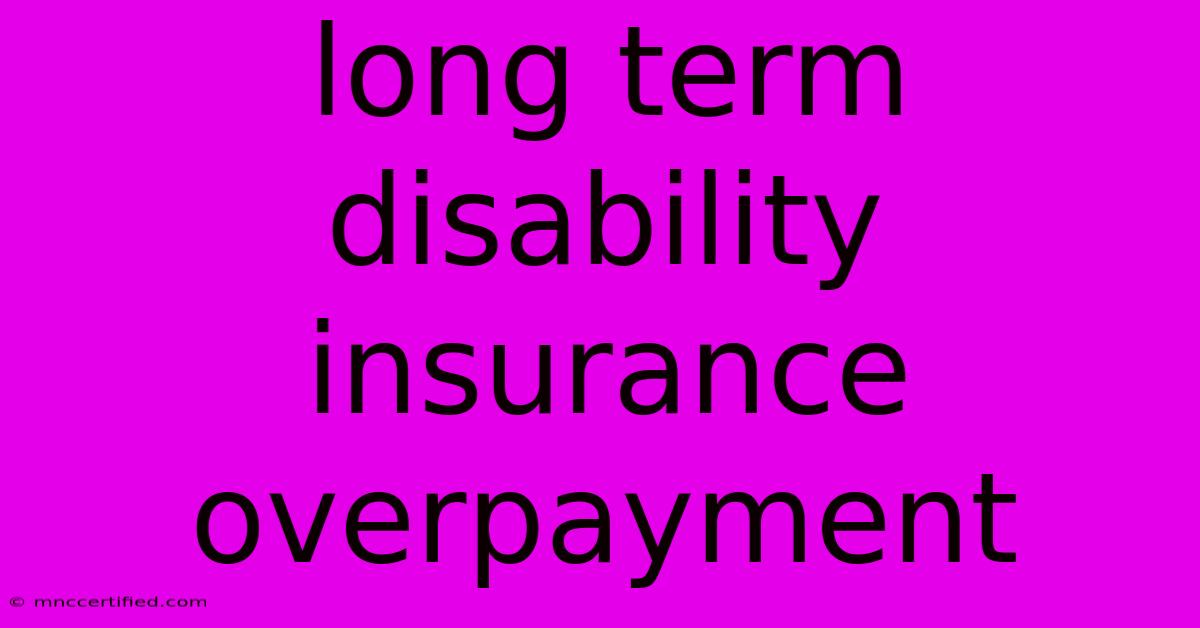Long Term Disability Insurance Overpayment

Table of Contents
Long-Term Disability Insurance Overpayment: What You Need to Know
Receiving long-term disability (LTD) benefits can be a lifeline during a difficult time. However, sometimes insurance companies mistakenly overpay benefits, leading to a situation that can be confusing and stressful. This article will explain what long-term disability overpayment is, how it happens, and what you can do if you find yourself in this situation.
What is Long-Term Disability Overpayment?
Long-term disability overpayment occurs when an insurance company pays you more benefits than you were actually entitled to. This can happen due to a variety of reasons, including:
- Incorrectly calculated benefits: The insurance company may have used the wrong information to calculate your benefits, such as your salary, your waiting period, or your disability definition.
- Failure to report changes: If your situation changes, such as returning to work part-time or receiving other income sources, you must notify your insurance company. Failing to do so can lead to overpayment.
- Fraudulent claims: In some cases, individuals may intentionally provide false information to receive higher benefits. This is considered fraud and can have serious consequences.
How Can Overpayment Occur?
Several factors can contribute to an overpayment situation:
- Administrative Errors: Insurance companies are large organizations, and mistakes can happen. Sometimes errors in data entry or incorrect application of policy terms lead to overpayments.
- Incomplete or Inaccurate Information: If you provide inaccurate information during the claims process, like your income or work history, it can impact the accuracy of your benefits calculation.
- Changes in Your Circumstances: Significant life changes, such as returning to work part-time, receiving other income sources (like a settlement), or becoming eligible for Social Security disability, must be reported to the insurance company. Failing to do so can lead to overpayments.
What Happens if You've Been Overpaid?
If an insurance company discovers an overpayment, they will typically send you a letter outlining the amount of overpayment and requesting repayment. Depending on your policy and the circumstances of the overpayment, you may have several options:
- Repayment: You can repay the full amount of the overpayment within a specified timeframe.
- Payment Plan: The insurance company may allow you to repay the overpayment in installments.
- Appeal: If you believe the overpayment is unjustified, you can appeal the decision. This process often involves providing documentation and arguing your case.
- Offsetting Future Benefits: In some cases, the insurance company may deduct the overpayment from your future benefits.
Tips for Avoiding Overpayment
- Provide accurate information: Ensure all the information you provide to the insurance company is correct and complete. Double-check your application and keep a copy for your records.
- Report changes promptly: Notify your insurance company immediately if your situation changes, such as returning to work or receiving other income.
- Keep detailed records: Maintain meticulous records of your income, expenses, medical information, and communications with the insurance company. This will help you track your benefits and potentially defend against overpayment claims.
- Understand your policy: Read your policy carefully and understand the terms and conditions, including the definition of disability and the reporting requirements.
- Consult with a lawyer: If you're facing an overpayment situation, consider consulting with a disability lawyer who can advise you on your rights and options.
Conclusion
Long-term disability overpayment can be a complex and stressful issue. By understanding the causes, potential consequences, and ways to avoid overpayment, you can better protect yourself during this challenging period. Remember to maintain clear communication with your insurance company, keep accurate records, and consult with legal counsel if needed.

Thank you for visiting our website wich cover about Long Term Disability Insurance Overpayment. We hope the information provided has been useful to you. Feel free to contact us if you have any questions or need further assistance. See you next time and dont miss to bookmark.
Featured Posts
-
Watch Crvena Zvezda Vs Barcelona Champions League
Nov 07, 2024
-
Bayern Munich Vs Benfica Match Begins
Nov 07, 2024
-
Trevor Sorbie Styling Legends For Decades
Nov 07, 2024
-
Droopy Eyelid Surgery Covered By Insurance
Nov 07, 2024
-
Neutral Ground Bonding Plug For Generator
Nov 07, 2024